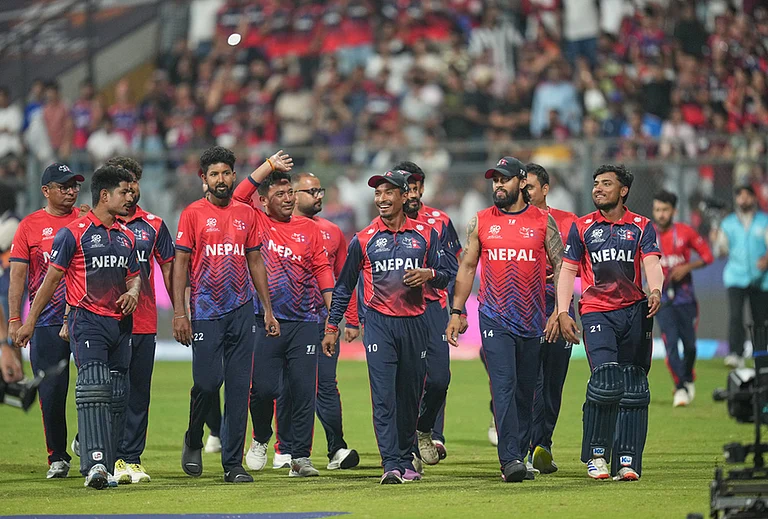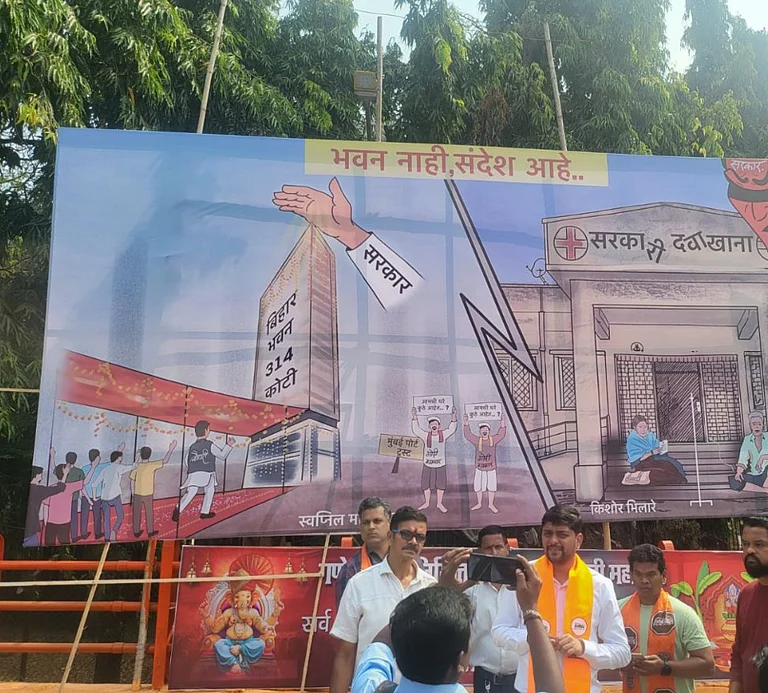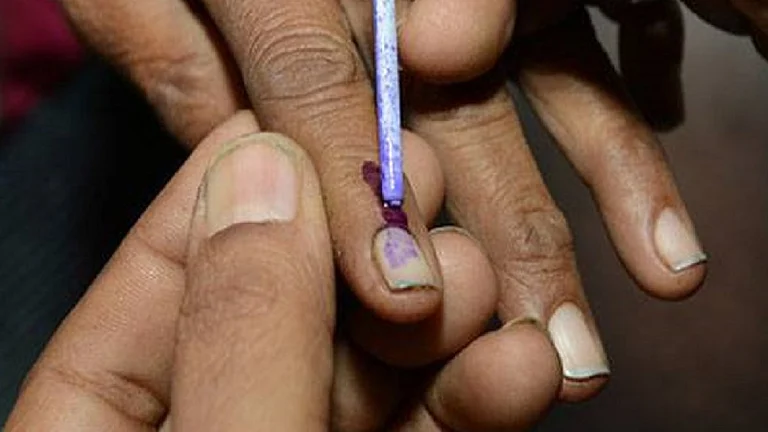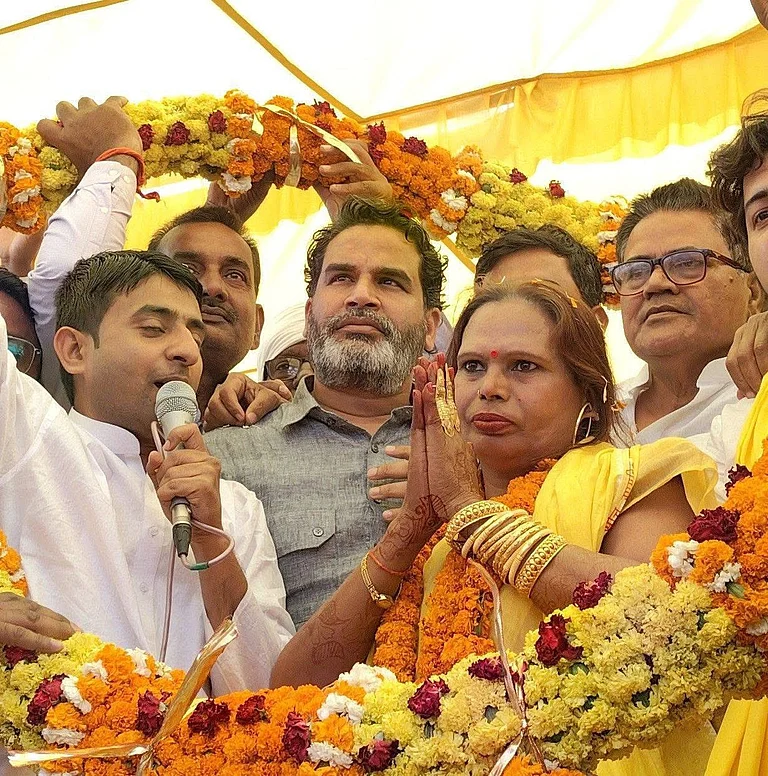
According to the most recent study (2020) by the Institute of Population Sciences (IIPS) more than half of the households in Bihar are exposed to migration
Many migrants from Bihar face key challenges like lack of money for travel expenses, no leaves to go to Bihar to vote in the 2025 assembly elections.
Intra state migrants were more vulnerable during SIR, investing days to ensure their names in the electoral roll with the help of activists and unions, many women domestic workers among them have no voice to seek a leave from employers to reach the polling booths.
Gangaprasad Singh, 53 a migrant from Darbhanga- Bihar, was sitting quietly listening to Deepak Darbhangiya’s bhajan in Maithili on YouTube with his mobile phone on November 4. It was one in the morning, Singh was on his night shift at the entrance gate of Sakivihar complex, in east Andheri Mumbai. As Bihar is all set to poll for the first phase of the 2025 assembly election on November 6, Singh and few other migrant workers that Outlook interviewed remained vulnerable distant spectators of the biggest festival of democracy.
Although, Singh is highly opinionated about the politics, is unable to cast his vote on November 6. Reasons? Many.
“Hum das hajar rupaye me kam karte hai, chutti hi nahi milta, bimar pad gaya kisi din, to agency paisa kat leta hai. upar se train me reservation nahi, log bhed-bakri jaisa safar kiya chhat me, to kaise gav jayega?” (we work for just ten thousand rupees a month and don’t get a single day off. If we fall sick even for a day, the agency cuts our pay. Also there’s no train reservations available, many travelled in insanely full trains for Chhath pooja. It is impossible to travel to my hometown,”) he says.
From Darbhanga’s Manigachhi village, he migrated to Mumbai 30 years ago, started working as a security guard earning Rs 1,800 as his first salary back then which is now raised to 10,000 rupees a month for over 30 years. He has neither social security nor health insurance, or provident fund savings. Retirement and retirement funds words are not part of his dictionary of life. His two sons—Balram who has received B.A degree and younger one Chandan who has done SSC— have also migrated to Mumbai after covid and are doing daily wage work. They find odd jobs such as painting house when they can.
Premsheeladevi, 50, wife of Singh is a homemaker and sometimes toils on a piece of land that’s less than a half-acre land, sowing dhan and chana. When Singh speaks of his wife celebrating Chhath puja, a broad smile spreads across his face. After 2017, Singh only managed to go to his hometown in 2023 for his younger brother’s funeral and he doesn’t know when he will go again.
“Gaaon ki yaad aati hogi?” I asked. Singh couldn’t say anything but tears in his eyes did. After minutes of vulnerable silence, he said, “I do video calls sometimes to see my wife and daughter. I haven’t chosen this life but I don’t have any other option to survive.”
Asked where he resides in Mumbai, Singh pointed towards the security cabin—his 70 square foot home. Inside the cabin, he’s kept one sack, which has one thin blanket, a single steel plate, a bowl, and a water bottle.
“Yaha kaunasa ghar yahi pe rahte hai, isi chowki main, 10 hajar me se teen hajar khane pe kharch hota hai, panch so me mobile, dadhi cutting, chai vagera ka kharcha nikalta hoon, baki ghar pe bhejta hoon.” (What home are you talking about? I live in this work cabin only. Out of the ten thousand rupees I earn, three thousand go for food, around five hundred for mobile recharge, shaving, tea, and other small expenses, the rest I send back home.”)
People who live in high rise buildings around his workplace sometimes say “He is Bihari, illiterate, uncivilised,” in a derogatory manner. How they’ll treat him differs from individual to individual. Two to three residents from his workplace gave him Rs. 50 to 100 and a small box of sweets on Diwali. Others photographed him napping in cabin and complained to his employer agency which deducted Rs. 1000 as a fine from his salary. Singh pleaded with the agency as well as residents that he was napping for a few minutes and after his 12-hour shift ended, showed them the register. Nobody listened and believed him.
There are few other security guards nearby residential societies who work in 12-hour shift at one society and right after that resume another 12-hours shift at another nearby society to secure more income which can be sent to their children’s education, hoping their children will break the cycle of intergenerational poverty someday. The 24-hour security guards have not had a full nights’ sleep for as long as they can remember—which is years. They catch winks for a few minutes naps at a time, while on duty, inside the entrance cabin or on the chairs. Those who don’t have CCTV cameras around their desk, allowing them quick naps, consider themselves lucky.
Another security guard Pawan Choudhary who works in the same complex hails from Darbhanga’s Lagma village. Choudhary, 54 has the similar story, except his son’s pursuit of a software engineering degree in West Bengal’s Haldiya. Choudhary is also vulnerable to pay cuts for leaves and travelling challenges to Bihar for casting his vote.
“Rajheet me to bahut interst hai, ham Laluji ka bhashan sune the 1997 ke phale, tab se. Lekin ab kya kare? Voting to nahi ja sakta, yahan pe youtube pe sab ka bhashan sun raha hoon, khabare dekh raha hoon.” says Choudhary. (I am very much interested in politics, from the time I had heard Laluji’s speech before 1997. But, I can’t go back to vote. I listen to all the speeches in political rallies and follow the news on YouTube here.”)
Choudhary also said that in the 2020 assembly election, he voted for the BJP, but for him BJP-JDU did not do much for the development.
“Pichli baar ham BJP ko vote diya, lekin is bar lag raha hai ki lalten ki lehar hai. Hamare ghar ke log lalten chaap pe hi vote dalta aaya hai bahot saalon se.” (Last time in 2020, I voted for the BJP, but this time it feels like there’s a wave for the lantern. People in my family have been voting for the lantern symbol (RJD) for many years.”
Choudhary has all his opinions and years of understanding of Bihar’s politics, sugar mills, employment, development, ‘Jungle Raj’, caste politics but nothing can translate into vote. For him, The ‘jungle raj’ is something very different from others. “Mai jo ‘jungle raj’ dekha hoo, vo ye hai ki goon ke bagal vali sugar mill 1996 ke dauran band hui, or uske bad voh khali jagah pe ped paudho ka jungle ban gaya bas. kooch naya nirman nahi hua, jo rojgar de sake.” (The ‘jungle raj’ I have seen is the sugar mill next to my village that shut down around 1996, and since then, the vacant land has just turned into a ‘jungle’ of wild trees. Nothing developed which could create jobs.)
There are many stories of migrants like Choudhary and Singh in Mumbai. Construction workers, daily wage workers who have migrated from Bihar who are missing out on voting for the assembly election.
Around 7.5 million people migrated to different states from Bihar according to the 2011 census report, while a most recent study by the Institute of Population Sciences (IIPS) notes that more than half of the households in Bihar are exposed to migration to more developed places within or outside India.
“Most agrarian labourers go to Haryana and Punjab because of better wages there as compared to Bihar. Industrial labourers go to Gurugram, Mumbai, Gujrat etc. For them, travelling to Bihar for voting is a luxury. The intra state migrant workers that we are working with for their rights faced many challenges during the SIR. We accompanied them to the administrative offices multiple times to ensure their names are there in the electoral roll and they should not be disenfranchised from voting.” said Vivek Kumar, Patna based activist with Revolutionary Workers’ Party.
Varuni, a student activist with Disha organisation, shed light on women’s voting. “Those who migrate from rural to urban Bihar, working as domestic workers, get less pay and more abuse - it's all - class, caste, gender exploitation. They don’t get a leave for half day or some concession on polling day to go for voting,” Varuni says.
In the 2020 assembly election, migrant workers voted in significant numbers because they went back to their hometowns due to Covid-19 pandemic, according to Dr. Chandan Ashish, migrant and labour and researcher from Bihar.
Ashish explains, “Migration is the key issue for Bihar and INDIA block raised it, although Prashant Kishor’s Jan Suraaj initiated this first before election campaigns kicked off. But this didn’t become the very larger issue on all political party’s agendas as it should have been.”
There is no official- consolidated data on the migrants of Bihar even with the labour department, though Bihar is a huge labour market in India, according to Ashish. He struggled to find any official data during his Ph.D. and post-doctoral research.
Talking about the voting pattern of Bihar migrants, “He says, we can’t say much without basic migrants data in the first place. and it's a challenge for policy making too. But family members of migrants, mostly women who are left behind in Bihar do see the Jeevika didi, Vriddha pension revision from Rs 400 to 1,100 as important work by JDU though it came right before elections.”
Vivek Kumar, and a couple of other activists along with Dr. Chandan Ashish, we spoke to over telephonic interview from Bihar, echoed the same, that women’s vote will benefit JDU, though they see it as an election strategy and not a sustainable development program.
Varuni has different observations and experience on the ground. Anganwadi workers, helpers who get paid not more than rupees five thousand a month, are not happy with Jeevika Didi one time funds, because their young daughters, sons are preparing for government jobs since years, many had to migrate to other states for employment and are living in precarious conditions, aren’t happy with just Jeevika didi and Vriddha Pension raise.
“Sarkari job ke liye kalam ghaseetate ghaseetate unke bachho ki Jawani barbad hui. Pahle Maaen dur des gaye hue beto ki chinta karti thi, ab toh beta- beti our roti dono ki chinta,” says Varuni.

































